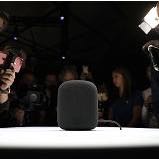(Original title: Apple's smart speaker "jumping ticket" faced with traditional brands and Chinese competitors)
Apple's smart home speaker HomePod could have been a "blockbuster" for the Christmas shopping season, but it may now be a gift in the Easter basket.
Following the delayed delivery of the iPhone X, the HomePod, a smart speaker released in June of this year, faced a "jumping ticket."
Apple said in a statement on Friday: "HomePod will take some time to meet with consumers. We will be the first to launch in the US, UK and Australia in early 2018."

According to Apple's initial plan announced at the new product launch in June this year, HomePod will be listed on the occasion of the Christmas shopping season in December this year. As for when it was specifically listed, Apple did not make a clear response to the first financial reporter. Apple also did not disclose the specific reasons for the delay in listing.
HomePod's official price is $ 349, which is far higher than the price of Amazon's latest smart speaker Echo Show. The official price of Echo Show is $ 230. Google's smart home Google Home sells for as little as $49.
Apple's HomePod will carry the Siri voice control system. Prior to the release of HomePod, Apple did not seem to be optimistic about the smart speaker market. Apple's deputy director of marketing Schiller has said: "People may not want to speak to a machine that does not want to talk." He also mocked Amazon's Echo because it lacks a screen and it is difficult to be widely accepted by the market.
However, in order to obtain more profitable growth points, Apple eventually had to choose to enter the crowded market of smart homes, to win over consumers by releasing "new stuff" such as HomePod, and Apple already owns a software platform like Homekit, Smart Home. For Apple, it is a matter of course.
However, Apple is still uncertain about whether it can occupy the already crowded market as a "latecomer" of the smart audio market, and considering the relatively high price of HomePod, consumers may not pay for it.
At present, Amazon accounts for more than half of the market for smart speakers. According to the latest research report from research firm eMarketer, in the intelligent voice-controlled speaker market, Amazon has occupied more than 70% of the market share, Google's market share is 24%. The number of smart speaker users worldwide is expected to double to 35.6 million this year.
Amazon’s Echo Show is already the company’s fourth smart speaker product since 2014. According to Morgan Stanley's statistics, Amazon Echo sold a total of 11 million units last year.
Canalys analyst Ishan Dutt told CCP reporters: "Apple may wish to catch up with smart homes. But artificial intelligence and smart assistants are not their core product and top development needs. By contrast, Google and Amazon are More serious participants."
Although Apple may lag behind competitors in terms of artificial intelligence, but in terms of music, Apple has an inherent advantage. Because Apple itself has streaming music services, and it has acquired music accessories companies like Beats, if it can be combined with more hardware, it will help create an ecosystem around music entertainment.
But in this area, Apple also faces competition from traditional home audio brands. Take Sonos, an American home speaker brand, for example. Sonos has integrated Amazon Alexa into its products, allowing millions of Sonos owners to control music through their voices. At the same time, they can also perform tasks such as ordering and playing games outside of music to help people improve their performance. Quality of life function.
Sonos and Apple are long-time partners, and Sonos's platform can play streaming media libraries including Spotify, Apple Music, Pandora, and Tencent Music. However, Sonos is increasingly approaching the direction of the voice assistant, a process that accelerates the convergence of music and artificial intelligence.
Although Sonos currently only accesses the Alexa platform, its goal is to work with all voice assistants, whether Alexa, Cortana, Google Voice Assistant or Siri.
As the most important market for Apple, China has also emerged as a strong contender for multiple Apple smart speakers in recent years. For example, a question asked by former Google engineer Li Zhifei, he launched the newly developed wireless smart speaker Tichome for Chinese and overseas markets in September this year.
The combination of Tichome and the artificial intelligence assistant is regarded as the Chinese version of Amazon Echo. In response, Li Zhifei told the First Financial reporter: “The smart speaker that is being asked is more user-friendly and more practical than Echo, and can more accurately realize the functions of dialogue, voice interaction, and personal identification.â€
The later the HomePod launches, the more space it gives to competitors. This is also the price paid by Apple for its aggressive market strategy. Apple's flagship model iPhone X from the current shipping speed point of view, even the first booking of consumers, may also be the first to reach the new machine in December. In order to produce enough iPhone X, Apple is working with suppliers to speed up the production process.
Apple’s chief designer Jony Ive said in a discussion at the New Yorker in October this year that the iPhone X technology was developed by Apple over five years. But even considering the difficulties faced by face recognition technology in production, Apple did not give suppliers more time - still only two years of production preparation. Apple's time schedule seems to be too radical in the industry.
According to KGI analyst Guo Mingchi’s forecast, Apple iPhone X shipments will reach 25 million to 30 million units in the upcoming shopping quarter. In the same period last year, all iPhone models shipped by Apple reached 78 million units.